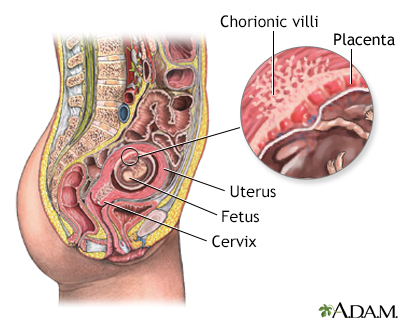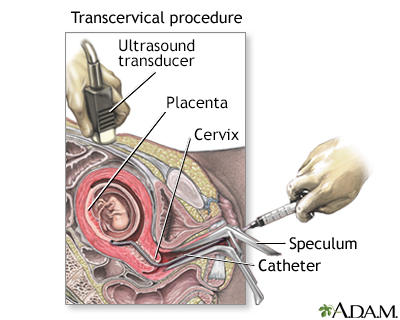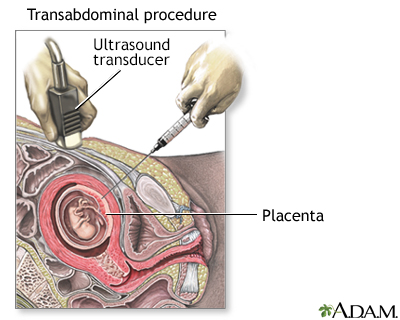  |
Procedure - Chorionic Villus Sampling |
 Chorionic villi are microscopic projections that line the chorion, the outermost layer of the embryonic sac. Surgeons sample these projections for genetic testing because they contain the same genetic material as a fetus. If you are at risk for delivering a baby with genetic abnormalities, your health-care provider may recommend this prenatal test, which is performed at 10 to 12 weeks gestation to find out a fetus' genetic makeup. |
Procedure - Chorionic Villus Sampling |
 To take a chorionic villus sample, your surgeon either enters the uterus through the cervix (transcervical procedure) or through the abdomen (transabdominal procedure). The fetus' position in the uterus determines which procedure the surgeon uses. |
Procedure - Chorionic Villus Sampling |
 If your surgeon uses a transcervical procedure, he opens your vagina with a speculum and eases a thin catheter through it and your cervix. Your surgeon then moves the catheter to the chorionic villi with the guidance of an ultrasound. He checks the fetus' position on the ultrasound screen so he can maneuver the catheter within the uterus without harming the fetus. |
Procedure - Chorionic Villus Sampling |
 If your surgeon uses the transabdominal procedure, it will be very similar to amniocentesis. He inserts a needle through your abdomen and uterus to the chorionic villi. As with the transcervical procedure, your surgeon uses ultrasound to determine the fetus' position to help guide the needle safely to the chorionic villi. |
Procedure - Chorionic Villus Sampling |
 Once the catheter or needle reaches the chorionic villi, your surgeon withdraws a small sample and carefully removes it from the uterus. You should receive Rh immune globulin (RHIG) at the time of CVS if you are an Rh-negative unsensitized patient. The sample is sent to a laboratory. How the lab technicians handle the sample depends on the genetic abnormalities they are looking for and the type of technology they use. They will extract chromosomes from the sample's cells to find out if your fetus is carrying any genetic abnormalities. In most cases, your health-care provider will have your test results back within two weeks. The results can help you and your partner decide whether to carry the pregnancy to term, or how to prepare for the baby you will deliver. |